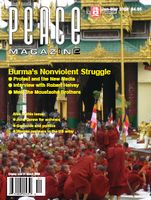
Peace Magazine Jan-Mar 2008, page 31. Some rights reserved.
Search for other articles by PMag staff here
A letter from the Ottawa-based organization "Educating for Peace" asks the Ontario Ministry of Education to require peace education in every classroom. To do so, the Ministry will need to provide teachers with professional development and resources for many years ahead. About two-thirds of Ontarians favor increased funding for all levels of education and the group notes that 55 percent of those surveyed are willing to pay more taxes to support public education. Educating for Peace is inviting other citizens to support the proposal.
Contact Penny Sanger <pennysanger@sympatico.ca> or Blodwen Piercy <jepiercy@cyberus.ca>.
According to the California Democratic Representative Ellen Tauscher, until formal agreements are completed between Poland, the Czech Republic, and the United States, construction for missile defence sites in Europe will be halted. The Bush administration seeks to place 10 missile interceptors in Poland and a radar site in the Czech Republic, arguing that they are necessary to protect against Iranian missiles. Tauscher argues that a long-range missile threat from Iran is non-existent and that the missile interceptors to be deployed in Poland have not been adequately tested.
Polish and Czech public opinion polls seem to side with Tauscher's outlook as majorities in both countries oppose the deployment of American missile defences on their soil. On Nov. 17, around 1,000 protestors took to the streets in Prague to protest their government's participation in the US proposed missile defence system.
Tauscher urges more dialogue with all NATO allies regarding a comprehensive European missile defence system and with Russia on assuaging their concern that a missile defence system in Eastern Europe is targeted toward them. (Source: Center for Defense Information.)
Nuclear non-proliferation and disarmament has become an issue in the US presidential campaign. Democratic and Republican contenders are expressing their positions on the wisdom of the Iraq war, on approaches to dealing with Iran's developing nuclear capability, and on how far the US should go for nuclear disarmament.
On the Democratic side, Dennis Kucinich has called for a global treaty to abolish nuclear weapons, has introduced a bill supporting this call, co-sponsored a bill disavowing the preventive use of force as a counter-proliferation measure, and sponsored related acts on prevention of an arms race in outer space and on the establishment of a Department for Peace.
John Edwards has publicly supported the proposal made by Kissinger, Schultz, Nunn and Perry that the US exert leadership in establishing a nuclear-weapons-free world. Edwards called their op-ed piece "very thoughtful. And I think essentially what they said ... was that we should aspire to a nuclear-free world. I agree with that." At the Iowa presidential debate on August 19, Edwards affirmed that as president he would "lead an international effort to eliminate nuclear weapons."
Barack Obama affirmed the same goal in a speech in Chicago on October 2. He said, "Here's what I'll say as president: America seeks a world in which there are no nuclear weapons" and that "the best way to keep America safe is not to threaten terrorists with nuclear weapons -- it's to keep nuclear weapons and nuclear materials away from terrorists."
Obama recently co-introduced with Chuck Hagel a senate bill that would strengthen measures against terrorist access to nuclear weapons and fissile materials, support the efforts of the International Atomic Energy Agency (IAEA) and establish an international fuels bank to prevent the development of proliferation-sensitive facilities in new countries. He also stated that nuclear weapons should not be used in any way that could impact on civilians -- and that he cannot envisage a use that would not affect civilians.
Hillary Clinton says she will make cuts in nuclear arsenals, though they will not be very deep in order to not provide an "incentive" for other states to attempt to match US arsenals. She also refused to rule out the use of nuclear weapons in the war on terror.
The Republican contenders are generally more supportive of the use of force and less supportive of nuclear disarmament. Rudy Giuliani and John McCain said they might use force against Iran to keep it from getting nuclear weapons. Ron Paul is the only Republican candidate who opposed the war against Iraq, and also now opposes the use of force against Iran.
Source: Parliamentarian Network for Nuclear Disarmament.

Peace Magazine Jan-Mar 2008, page 31. Some rights reserved.
Search for other articles by PMag staff here